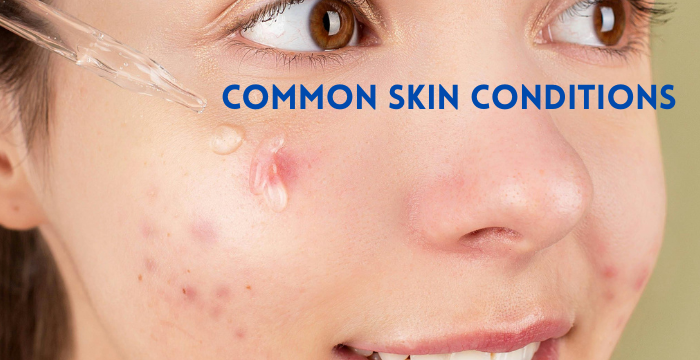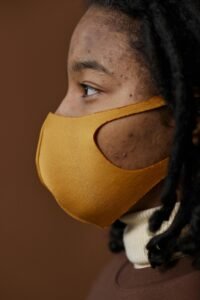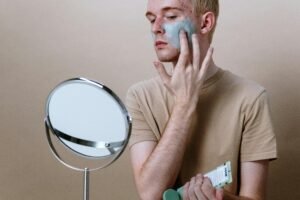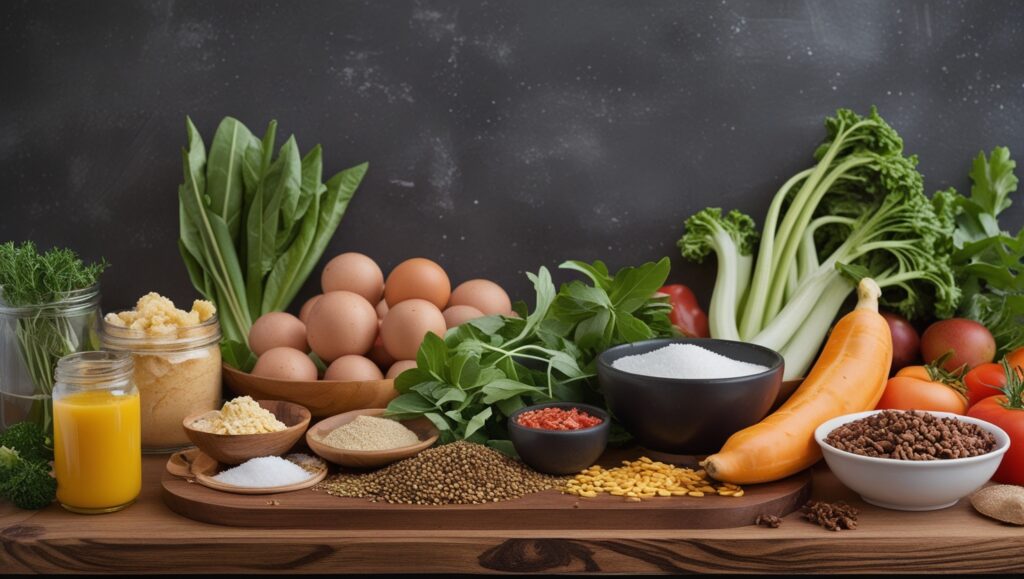
Acne
- Acne: Acne occurs when hair follicles become clogged with oil and dead skin cells, leading to whiteheads, blackheads, or pimples. It is nearly universal during adolescence, with individual differences in severity emerging in the late teenage years. Acne can persist into adulthood, especially in women.
Causes of Acne: There is a clear relationship between the severity of acne and the rate of sebum (oil) excretion. While increased sebum production is necessary for acne to develop, it is not sufficient on its own. Hormonal changes are the primary determinant of sebum production.
Other factors include:
- Hormonal changes
- Oily cosmetics and hair products
- Certain medications, such as steroids, testosterone, estrogen, and phenytoin
- Physical contact, like touching or rubbing the skin
Types of Acne:
- Open comedones (Blackheads): Occur due to plugging of the pilosebaceous orifice by keratin and sebum.
- Closed comedones (Whiteheads): Form deeper in the pilosebaceous ducts due to the accumulation of sebum and keratin.
- Papules: Inflamed lesions that appear as small, pink bumps and can be tender.
- Nodules: Solid, painful lumps.
- Pustules: Small red pimples with pus at their tips.
- Cysts: Inflammatory acne causing painful, pus-filled pimples deep under the skin.

Appearance of Acne:
- Blackheads: Small, dark bumps due to oxidation.
- Whiteheads: Flesh-colored bumps.
- Pimples: Red, tender bumps with a white or yellow center filled with pus.
- Papules: Small, red, infected hair follicles.
- Nodules: Large, painful, solid lumps deep within hair follicles.
- Cysts: Painful, pus-filled lumps.
Where Does Acne Occur?
Acne typically appears on the face, shoulders, upper chest, and back, but it can also extend to the buttocks.
Foods That Can Cause Acne:
- High Glycemic Index Foods: Foods that cause rapid spikes in blood sugar, such as white bread, sugary snacks, and soft drinks, can increase sebum production and inflammation.
- Dairy Products: Some studies suggest a link between dairy consumption and acne, possibly due to hormones in milk.
- Foods Rich in Fats and Oils: A diet high in unhealthy fats, calories, and refined carbohydrates (such as those found in fried and fast foods) may contribute to acne development.
How to Manage and Prevent Acne:
- Wash your face regularly with warm water and a facial cleanser.
- Use oil-free moisturizers.
- Avoid skincare and makeup products that contain oil.
- Eat a balanced diet and stay hydrated.
- Take steps to reduce stress.
- Avoid touching your face or resting your cheek or chin on your hand. Don’t pick or pop pimples.
- Limit sun exposure, as ultraviolet rays can increase inflammation and redness.
- Keep your hair clean to avoid excess oil transfer to the skin.
- Tea tree oil can decrease inflammation and help reduce acne.
- Avoid scrubbing your skin harshly.
Can Acne Cause Scars?
Yes, acne can cause scars, especially in the following conditions:
- Inflammation: Severe acne, such as cysts or nodules, can lead to significant inflammation and scarring.
- Delayed Treatment: Not treating acne promptly can increase the likelihood of scarring.
Types of Scars:
- Atrophic Scars: Depressed scars caused by insufficient collagen production.
- Hypertrophic Scars: Raised scars due to excess collagen production.
Risk Factors for Developing Acne:
- Hormonal Changes:
- Puberty: Increased androgens cause sebaceous glands to enlarge and produce more oil.
- Menstrual Cycle: Hormonal fluctuations before and during menstruation.
- Pregnancy: Hormonal changes during pregnancy.
- PCOS: Polycystic Ovary Syndrome leads to hormonal imbalances that can cause acne.
- Genetics: Family history plays a significant role.
- Certain Medications: Drugs like corticosteroids and lithium can contribute to acne.
- Stress: Triggers hormonal fluctuations that increase oil production.
- Skin Type: Oily skin is more prone to acne due to excess oil clogging pores.
- Cosmetic and Skincare Products: Oil-based or comedogenic products can lead to breakouts. Choose non-comedogenic products if you have acne-prone skin.
- Smoking: Some studies suggest a link between smoking and acne.

Acne Home Remedies:
- Tea Tree Oil: Has antibacterial properties that help reduce acne-causing bacteria. Dilute with water (1:9) and apply to the affected area with a cotton swab.
- Honey and Cinnamon Mask: Both have anti-inflammatory and antibacterial properties. Mix 2 tablespoons of honey with 1 teaspoon of cinnamon to form a paste. Apply it to your face and leave it on for 10-15 minutes before rinsing off.
- Aloe Vera: Soothing and anti-inflammatory, aloe vera helps heal acne and redness. Apply pure aloe vera gel directly to your skin as a moisturizer.
- Apple Cider Vinegar: Contains organic acids that help kill bacteria and dry up excess oil. Mix 1 part apple cider vinegar with 3 parts water, apply with a cotton ball, leave on for 5 to 20 seconds, then rinse off.
- Green Tea: Rich in antioxidants, green tea helps reduce inflammation and fight bacteria. Apply cooled green tea with a cotton ball, or mix tea leaves with honey to create a mask.
- Lemon Juice: Contains citric acid, which helps dry out pimples and reduce oil. Apply freshly squeezed lemon juice to acne spots with a cotton swab. Leave on for 10 minutes, then rinse off.

